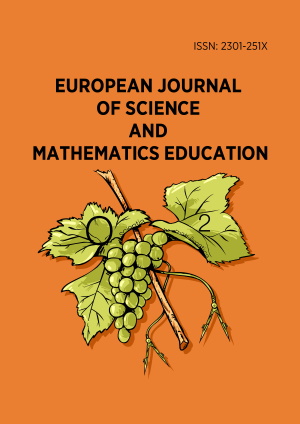Review Article
STEM professional development programs for science and mathematics primary school teachers: A systematic literature review
More Detail
1 Faculty of Education, The National University of Malaysia, Bangi, MALAYSIA2 School of Mathematical Sciences, The National University of Malaysia, Bangi, MALAYSIA3 Ministry of Education Malaysia, Putrajaya, MALAYSIA* Corresponding Author
European Journal of Science and Mathematics Education, 11(4), October 2023, 738-753, https://doi.org/10.30935/scimath/13629
Published Online: 02 September 2023, Published: 01 October 2023
OPEN ACCESS 5106 Views 1798 Downloads
ABSTRACT
In order to compete worldwide, the school system must be transformed by raising educational standards by implementing the science, technology, engineering, and mathematics (STEM) education approach. The purpose of the primary school curriculum is closely aligned with the teaching goals of STEM education, which is to develop each child’s full potential, foster an interest in learning and promote children to develop skills in life. Training qualified science and mathematics primary teachers through professional development (PD) programs is necessary to raise young children who are knowledgeable and skilled in STEM. Therefore, a systematic literature review examined the significance and implementation of STEM PD programs for science and mathematics primary school teachers. The Scopus and Web of Science databases were utilized to find articles written and published between 2018 and 2022. This review gathered 22 articles and produced 14 subthemes under the main themes: Significance and the implementation of STEM PD for primary school teachers. Recommendations for further research are stated at the end of this paper.
CITATION (APA)
Abd Ghani, A., Rosli, R., Iksan, Z., Halim, L., Osman, K., Maat, S. M., Mahmud, S. N. D., Mahmud, M. S., Rambely, A. S., & Lay, A. N. (2023). STEM professional development programs for science and mathematics primary school teachers: A systematic literature review. European Journal of Science and Mathematics Education, 11(4), 738-753. https://doi.org/10.30935/scimath/13629
REFERENCES
- Anagun, Ş. S., Karahan, E., & Kilic, Z. (2020). Primary school teacher candidates’ experiences regarding problem-based stem applications. Turkish Online Journal of Qualitative Inquiry, 11(4), 571-598. https://doi.org/10.17569/tojqi.793820
- Araya, R. (2021). Enriching elementary school mathematical learning with the steepest descent algorithm. Mathematics, 9(11), 1197. https://doi.org/10.3390/math9111197
- Arrington, T. L., & Willox, L. (2021). “I need to sit on my hands and put tape on my mouth”: Improving teachers’ design thinking knowledge, skills, and attitudes through professional development. Journal of Formative Design in Learning, 5(1), 27-38. https://doi.org/10.1007/s41686-021-00054-w
- Baker, C. K., & Galanti, T. M. (2017). Integrating STEM in elementary classrooms using model-eliciting activities: responsive professional development for mathematics coaches and teachers. International Journal of STEM Education, 4(1). https://doi.org/10.1186/s40594-017-0066-3
- Burton, M. (2022). STEM teaching experiences: Impacting elementary teacher candidates’ perceptions of teaching mathematics. Investigations in Mathematics Learning, 14(1), 14-27. https://doi.org/10.1080/19477503.2021.2023967
- Capobianco, B. M., DeLisi, J., & Radloff, J. (2018). Characterizing elementary teachers’ enactment of high-leverage practices through engineering design-based science instruction. Science Education, 102(2), 342-376. https://doi.org/10.1002/sce.21325
- Capone, R. (2021). Interdisciplinarity in mathematics education: From semiotic to educational processes. Eurasia Journal of Mathematics, Science and Technology Education, 18(2), em2071. https://doi.org/10.29333/ejmste/11508
- Capone, R., Adesso, M. G., & Fiore, O. (2022). Distance lesson study in mathematics: A case study of an Italian high school. Frontiers in Education, 7. https://doi.org/10.3389/feduc.2022.788418
- Chai, C. S. (2019). Teacher professional development for science, technology, engineering and mathematics (STEM) education: A review from the perspectives of technological pedagogical content (TPACK). Asia-pacific Education Researcher, 28(1), 5-13. https://doi.org/10.1007/s40299-018-0400-7
- Chen, Y., Chow, S. C. F., & So, W. W. M. (2020). School-STEM professional collaboration to diversify stereotypes and increase interest in STEM careers among primary school students. Asia Pacific Journal of Education, 42(3), 559-573. https://doi.org/10.1080/02188791.2020.1841604
- Corp, A., Fields, M., & Naizer, G. (2020). Elementary STEM teacher education: Recent practices to prepare general elementary teachers for STEM. In Handbook of Research on STEM Education (1st ed., pp. 337-348). Routledge.
- Correia, M., & Baptista, M. (2022). Supporting the development of pre-service primary teachers PCK and CK through a STEM program. Education Sciences, 12(4), 258. https://doi.org/10.3390/educsci12040258
- Corrigan, D. (2020). Implementing an integrated STEM education in schools: Five key questions answered. Education Futures. https://apo.org.au/node/307630
- D’Acunto, I., Capone, R., Giliberti, M., Barbieri, S., & Carpineti, M. (2018). Inquiry based teaching: An experience with THE TEMI E.U. project. EURASIA Journal of Mathematics, Science and Technology Education, 14(1), 275-278. https://doi.org/10.12973/ejmste/78158
- Dailey, D., & Robinson, A. (2017). Improving and sustaining elementary teachers’ science teaching perceptions and process skills: A postintervention study. Journal of Science Teacher Education, 28(2), 169-185. https://doi.org/10.1080/1046560X.2016.1277601
- Dailey, D., Jackson, N., Cotabish, A., & Trumble, J. (2018). STEMulate engineering academy: Engaging students and teachers in engineering practices. Roeper Review, 40(2), 97-107. https://doi.org/10.1080/02783193.2018.1434709
- DeCoito, I., & Myszkal, P. (2018). Connecting science instruction and teachers’ self-efficacy and beliefs in STEM education. Journal of Science Teacher Education, 29(6), 485-503. https://doi.org/10.1080/1046560X.2018.1473748
- Delahunty, T., Prendergast, M. A., & Ríordáin, M. N. (2021). Teachers’ perspectives on achieving an integrated curricular model of primary STEM education in Ireland: authentic or utopian ideology? Frontiers in Education, 6. https://doi.org/10.3389/feduc.2021.666608
- Desimone, L. M. (2011). A primer on effective professional development. Phi Delta Kappan, 92(6), 68-71. https://doi.org/10.1177/003172171109200616
- Durach, C. F., Kembro, J., & Wieland, A. (2017). A new paradigm for systematic literature reviews in supply chain management. Journal of Supply Chain Management, 53(4), 67-85. https://doi.org/10.1111/jscm.12145
- English, L. D. (2017). Advancing elementary and middle school STEM education. International Journal of Science and Mathematics Education, 15(S1), 5-24. https://doi.org/10.1007/s10763-017-9802-x
- Fernández-Limón, C., Fernández-Cárdenas, J. M., & Gómez Galindo, A. A. (2018). The role of non-formal contexts in teacher education for STEM: the case of horno3 science and technology interactive center. Journal of Education for Teaching, 44(1), 71-89. https://doi.org/10.1080/02607476.2018.1422623
- Goodnough, K. (2019). Understanding primary teachers’ professional learning and practice: An activity theory lens. Journal of Curriculum Studies, 51(3), 362-383. https://doi.org/10.1080/00220272.2018.1488997
- Guskey, T. R. (2002). Professional development and teacher change. Teachers and Teaching, 8(3), 381-391. https://doi.org/10.1080/135406002100000512
- Hamilton, M., O’ Dwyer, A., Leavy, A., Hourigan, M., Carroll, C., & Corry, E. (2021). A case study exploring primary teachers’ experiences of a STEM education school-university partnership. Teachers and Teaching, 27(1-4), 17-31. https://doi.org/10.1080/13540602.2021.1920906
- Hammersley, M., & Traianou, A. (2012). Ethics in qualitative research: Controversies and contexts. SAGE. https://doi.org/10.1177/1035719x1301300107
- Hasim, S. M., Rosli, R., Halim, L., Capraro, M. M., & Capraro, R. M. (2022). STEM professional development activities and their impact on teacher knowledge and instructional practices. Mathematics, 10(7), 1109. https://doi.org/10.3390/math10071109
- Havice, W., Havice, P., Waugaman, C., & Walker, K. (2018). Evaluating the effectiveness of integrative STEM education: Teacher and administrator professional development. Journal of Technology Education, 29(2), 73-90. https://doi.org/10.21061/jte.v29i2.a.5
- Hourigan, M., O’Dwyer, A., Leavy, A. M., & Corry, E. (2021). Integrated STEM-a step too far in primary education contexts? Irish Educational Studies, 41(4), 687-711. https://doi.org/10.1080/03323315.2021.1899027
- Kaderavek, J. N., Paprzycki, P., Czerniak, C. M., Hapgood, S., Mentzer, G., Molitor, S., & Mendenhall, R. (2020). Longitudinal impact of early childhood science instruction on 5th grade science achievement. International Journal of Science Education, 42(7), 1124-1143. https://doi.org/10.1080/09500693.2020.1749908
- Kraus, S., Breier, M., & Dasí-Rodríguez, S. (2020). The art of crafting a systematic literature review in entrepreneurship research. International Entrepreneurship and Management Journal, 16(3), 1023-1042. https://doi.org/10.1007/s11365-020-00635-4
- Kurup, P. M., Li, X., Powell, G., & Brown, M. E. (2019). Building future primary teachers’ capacity in STEM: based on a platform of beliefs, understandings and intentions. International Journal of STEM Education, 6(1). https://doi.org/10.1186/s40594-019-0164-5
- Kurup, P. M., Brown, M. E., Powell, G., & Xia, L. (2017). Future primary teachers’ beliefs, understandings and intentions to teach STEM. IAFOR Journal of Education, 5(SI). https://doi.org/10.22492/ije.5.si.07
- Lee, S. C., Jack, A. R., & Novacek, G. (2021). PD with distance-based instructional coaching to improve elementary teacher’ self-efficacy in teaching science. Journal of Science Teacher Education, 33(5), 509-530. https://doi.org/10.1080/1046560X.2021.1965751
- Liberati, A., Altman, D. G., Tetzlaff, J., Mulrow, C. D., Gøtzsche, P. C., Ioannidis, J. P. A., Clarke, M., Devereaux, P. J., Kleijnen, J., & Moher, D. (2009). The PRISMA statement for reporting systematic reviews and Meta-Analyses of studies that evaluate health care interventions: Explanation and elaboration. PLOS Medicine, 6(7), e1000100. https://doi.org/10.1371/journal.pmed.1000100
- Mangiante, E. S., & Gabriele-Black, K. A. (2020). Supporting elementary teachers’ collective inquiry into the “E” in STEM: Examining students’ engineering design work. Science and Education, 29(4), 1007-1034. https://doi.org/10.1007/s11191-020-00123-9
- Mohamed Shaffril, H. A., Samsuddin, S. F., & Abu Samah, A. (2021). The ABC of systematic literature review: the basic methodological guidance for beginners. Quality and Quantity, 55(4), 1319-1346. https://doi.org/10.1007/s11135-020-01059-6
- Mohd Shahali, E. H., Halim, L., Rasul, S., Osman, K., Ikhsan, Z., & Rahim, F. (2015). Bitara-STEMTM training of trainers’ program: Impact on trainers’ knowledge, beliefs, attitudes and efficacy towards integrated stem teaching. Journal of Baltic Science Education, 14(1), 85-95. https://doi.org/10.33225/jbse/15.14.85
- Mohd Shahali, E. H., Halim, L., Rasul, S., Osman, K., & Arsad, M.N (2018). Students’ interest towards STEM: A longitudinal study. Research in Science & Technological Education, 37(1), 71-89. https://doi.org/10.1080/02635143.2018.1489789
- Moher, D., Liberati, A., Tetzlaff, J., & Altman, D. G. (2009). Preferred reporting items for systematic reviews and meta-analyses: The PRISMA statement. BMJ (Online), 339(7716), 332-336. https://doi.org/10.1136/bmj.b2535
- Nesmith, S. M., & Cooper, S. (2019). Engineering process as a focus: STEM professional development with elementary STEM-focused professional development schools. School Science and Mathematics, 119(8), 487-498. https://doi.org/10.1111/ssm.12376
- Pleasants, J., Olson, J. K., & De La Cruz, I. (2020). Accuracy of elementary teachers’ representations of the projects and processes of engineering: Results of a professional development program. Journal of Science Teacher Education, 31(4), 362-383. https://doi.org/10.1080/1046560X.2019.1709295
- Porter, T., West, M. E., Kajfez, R. L., Malone, K. L., & Irving, K. E. (2019). The effect of teacher professional development on implementing engineering in elementary schools. Journal of Pre-College Engineering Education Research, 9(2), 64-71. https://doi.org/10.7771/2157-9288.1246
- Rahman, N. A., Rosli, R., & Rambley, A. S. (2021). Mathematical teachers’ knowledge of STEM-based education. Journal of Physics: Conference Series, 1806, 012216. https://doi.org/10.1088/1742-6596/1806/1/012216
- Rich, K. M., Yadav, A., & Larimore, R. A. (2020). Teacher implementation profiles for integrating computational thinking into elementary mathematics and science instruction. Education and Information Technologies, 25(4), 3161-3188. https://doi.org/10.1007/s10639-020-10115-5
- Silvestri, K. N., McVee, M. B., Jarmark, C. J., Shanahan, L. E., Pytlak-Surdyke, M., & English, K. (2019). Teacher identity in an after-school engineering club. The Elementary School Journal, 120(1), 1-31. https://doi.org/10.1086/704542
- Srikoom, W., Hanuscin, D. L., & Faikhamta, C. (2017). Perceptions of In-Service Teachers toward Teaching STEM in Thailand. Asia-Pacific Forum on Science Learning and Teaching, 18(2). https://eric.ed.gov/?id=EJ1179211
- Suebsing, S., & Nuangchalerm, P. (2021). Understanding and satisfaction towards stem education of primary school teachers through professional development program. Jurnal Pendidikan IPA Indonesia [Journal of Indonesian Science Education], 10(2), 171-177. https://doi.org/10.15294/jpii.v10i2.25369
- Turner, A., Logan, M., & Wilks, J. (2021). Planting food sustainability thinking and practice through STEM in the garden. International Journal of Technology and Design Education, 32, 1413-1439. https://doi.org/10.1007/s10798-021-09655-9
- Wahono, B., & Chang, C. Y. (2019). Assessing teacher’s attitude, knowledge, and application (AKA) on STEM: An effort to foster the sustainable development of STEM education. Sustainability, 11(4), 950. https://doi.org/10.3390/su11040950
- Wei, W. K., & Maat, S. M. (2020). The attitude of primary school teachers towards STEM education. TEM Journal, 9(3), 1243-1251. https://doi.org/10.18421/TEM93-53
- Williams, R. (2019). STEM implementation: A case study of a primary grade school [Doctoral Dissertation, American College of Education]. ProQuest Dissertation and Theses Database.
- Xiao, Y., & Watson, M. (2017). Guidance on conducting a systematic literature review. Journal of Planning Education and Research, 39(1), 93-112. https://doi.org/10.1177/0739456x17723971


 The articles published in this journal are licensed under the CC-BY Creative Commons Attribution International License.
The articles published in this journal are licensed under the CC-BY Creative Commons Attribution International License.